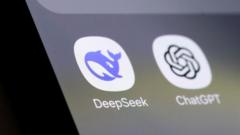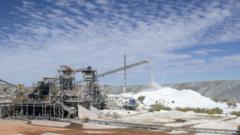The recent launch of DeepSeek, a new AI chatbot developed in China, has not only disrupted the technology sector but has also raised alarms in the US about the future of its leadership in artificial intelligence.
China's DeepSeek AI Disrupts Tech Industry and Sends Shockwaves Through US Markets

China's DeepSeek AI Disrupts Tech Industry and Sends Shockwaves Through US Markets
Chinese chatbot DeepSeek emerges as a fierce competitor, shaking the foundations of American AI dominance.
With its staggering development cost of just $5.6 million — a fraction compared to the billions spent by major players like OpenAI — DeepSeek quickly became the most downloaded free app on Apple's US App Store, leading to a significant plunge in tech stocks. Nvidia, a key player in the AI chip market, saw its stock price drop by 17% and lost nearly $600 billion in market value, marking the largest decline in US stock market history.
This dramatic shift has raised endless questions within Silicon Valley, with many investors and industry experts reacting with disbelief. Veteran analyst Gene Munster described DeepSeek's performance as "surprisingly good," while also questioning the startup's financial claims. Some market watchers viewed this turmoil as a potential buying opportunity, while others called into question the integrity of DeepSeek’s reported figures and whether the startup benefits from hidden subsidies.
In recent remarks, former President Donald Trump suggested that this moment serves as a wake-up call for the American tech industry. Just a week earlier, he had participated in a news conference alongside AI leaders like OpenAI's Sam Altman, announcing a joint venture aimed at substantial investments in AI infrastructure.
DeepSeek's sudden emergence may signify a shift in the competitive landscape of AI. The app’s developers assert that its cutting-edge technology is based on existing platforms and open-source software, yet some reports indicate that its founder’s hedge fund had previously stockpiled the necessary components for building advanced AI models.
In light of these developments, the ongoing dominance of semiconductor firms such as Nvidia appears increasingly uncertain. As AI competition heats up on a global scale, the implications of DeepSeek's rise could reshape America's approach to AI development.
With both the tech and energy sectors feeling the impact of this shift, it is clear that the assumptions surrounding AI development — including the need for significant capital and resources — are being challenged. As the landscape evolves, the US must adapt to both the pressures and potential benefits posed by emerging competitors like DeepSeek.
This dramatic shift has raised endless questions within Silicon Valley, with many investors and industry experts reacting with disbelief. Veteran analyst Gene Munster described DeepSeek's performance as "surprisingly good," while also questioning the startup's financial claims. Some market watchers viewed this turmoil as a potential buying opportunity, while others called into question the integrity of DeepSeek’s reported figures and whether the startup benefits from hidden subsidies.
In recent remarks, former President Donald Trump suggested that this moment serves as a wake-up call for the American tech industry. Just a week earlier, he had participated in a news conference alongside AI leaders like OpenAI's Sam Altman, announcing a joint venture aimed at substantial investments in AI infrastructure.
DeepSeek's sudden emergence may signify a shift in the competitive landscape of AI. The app’s developers assert that its cutting-edge technology is based on existing platforms and open-source software, yet some reports indicate that its founder’s hedge fund had previously stockpiled the necessary components for building advanced AI models.
In light of these developments, the ongoing dominance of semiconductor firms such as Nvidia appears increasingly uncertain. As AI competition heats up on a global scale, the implications of DeepSeek's rise could reshape America's approach to AI development.
With both the tech and energy sectors feeling the impact of this shift, it is clear that the assumptions surrounding AI development — including the need for significant capital and resources — are being challenged. As the landscape evolves, the US must adapt to both the pressures and potential benefits posed by emerging competitors like DeepSeek.


















